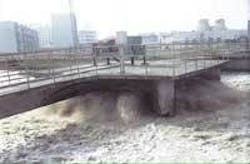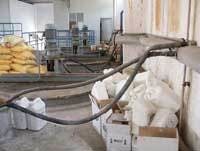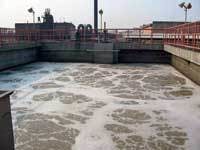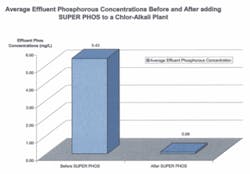Paper Mills: How to Meet Tough Phosphorous Discharge Limits
A paper & pulp mill in China discovered a product used in U.S. agricultural applications was much more effective at keeping wastewater phosphorous levels within discharge limits.
An Industrial Problem
Phosphorous is commonly added to industrial wastewater treatment plants to create a growth environment capable of sustaining a hungry biomass. The problem with adding phosphorous to feed wastewater microbes, is that most of it becomes unavailable because it immediately reacts with Ca2+, Fe3+, Mn, Mg2+ and Al3+ to form insoluble, biologically unavailable, phosphorous compounds.
The insolubility of phosphorous affects a microbes ability to assimilate enough phosphorous for proper floc formation and COD removal. Unused, insoluble phosphorous products pass the biomass and enter sensitive receiving waters creating problems in meeting discharge requirements.
Because phosphorous so quickly ties up in the water column, tests may show plenty of phosphorous in the aeration basin and effluent, but floc tissue analysis may show a biomass starved of this essential nutrient.
The question then becomes: “How do you get more phosphorous to wastewater microbes while discharging less?”
An Agricultural Solution
The answer for the Shanghai Chlor-alkali Chemical Co., in Shanghai, China, is in a product called Super Phos.
This product is an organically complexed form of phosphoric acid that’s designed to prevent premature formation of insoluble phosphorous precipitates. It starts out as food-grade phosphoric acid and is complexed with a humic acid complex derived from “Leonardite,” a soft lignite similar to brown coal.
Pre-complexing phosphorous with organic acids makes this phosphorous product many times more bio-available than regular phosphorous compounds because it is protected by carbon molecules from tying up in the water column. For years, it has proven itself as a superior agricultural nutrient and is now used in wastewater applications where maximum bioavailability is required and minimum effluent phosphorous concentrations are demanded.
Typically, a fourth to a tenth of the amount of this material is used compared to common grade agricultural type green 0-50-0 phosphoric acid fertilizers. This means reduced costs, easier handling with fewer regulatory constraints, and greater bioavailability that results in less phosphorous discharge and better wastewater treatment plant performance.
While Super Phos is primarily used as an agricultural nutrient, its application in wastewater was discovered by Dr. Lei Yuan while visiting the United States from China.
Beyond spuds
Dr. Yuan is a remediation expert in China specializing in cleaning up rivers, waterways and soils. His remediation projects and research are performed in conjunction with the Department of Environmental Science, East China Normal University, in Shanghai, China. While visiting the Pacific Northwest, he noticed potato farmers using this product in Washington state and thought it might have application in refineries and the paper and pulp industry in China.
Dr. Yuan observed farmers using this new phosphorus product at just 10% of the typical rate of green phosphoric acid and getting more phosphorous uptake into the potato plant at lower cost. He hypothesized that if potato plants in the soils of Washington were responding this well, what would it do to effluent phosphorous levels in wastewater plant effluents in China?
Some of the product was imported into Shanghai and, after three years of scientific studies in several mill and refinery wastewater plants, it was determined his initial assumptions about the performance in wastewater were correct. In fact, the results were so favorable, he concluded that this product could be shipped all the way from the manufacturing plant in Chandler, Ariz., to Shanghai, China, and still show a great return.
Figure 1 shows improvements Dr. Yuan made in effluent phosphorous concentrations using Super Phos in a chlor-alkaline plant. He also reports the following benefits wastewater operators realize when using the product:
• Improved phosphate bioavailability and uptake
• Stimulation of biological activity for enhanced COD/BOD removal
• Enhanced biological species diversity for better settleability
• Decrease in filamentous bacteria for less foaming
• Improved natural floc formation
Conclusion
Because of the special complexing Super Phos undergoes during manufacture, it’s less reactive with surrounding ions in the water column. This means the phosphorous in it is many times more bioavailable than regular phosphoric acid compounds. That results in better wastewater treatment plant performance with minimal phosphorous discharge. Solving phosphorous deficiencies means better floc formation, improved settleability, enhanced microbial species diversity, and greater metabolic efficiency.
About the Author: Steve Harris is director of wastewater operations for Probiotic Solutions, a division of BioHumaNetics Inc. Contact: 800-961-1220, ext. 224.




